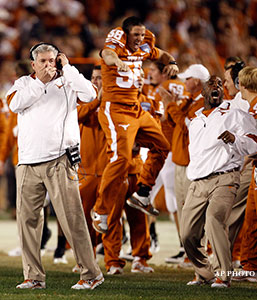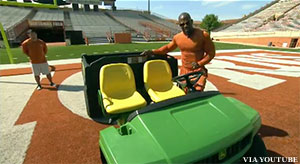
You've never heard of them, but Mickey Marotti and Bennie Wylie are two of the most important football coaches in America.
They're hires made within the last year at Ohio State University and the University of Texas, and they are already altering the future of both programs dramatically, in more ways than you could possibly imagine.
"I hesitate to say I wear 10 hats," Wylie said. "Because then I'll show up tomorrow and have 12 waiting for me."
Their expertise is labeled simplistically as strength and conditioning, but the job goes beyond the barking of orders and clanking of weights. It is an all-encompassing role, one that can make or break the title aspirations of a program.
Wylie was hired from Tennessee to work under Assistant Athletics Director for Strength and Conditioning Jeff Madden, and was considered a great coup during the overhaul of Texas' staff last winter, and Marotti is one of three crucial members from Meyer's staff at Florida brought to Ohio State with Urban Meyer's appointment, earning a similar title to Madden's at Texas.
"They're the heart and soul of your program," says Texas coach Mack Brown. "They have to have the guys in condition, and they have to push them while doing so within in the rules to be safe.
"At the same time, they have such a close relationship with the athletes that if the athlete is griping about a coach, our strength and conditioning guys have to stand up and get everyone back on the same page."
Meyer put it more bluntly in a recent interview with Pete Thamel of the New York Times:
"You can't function in today's era of college football without a superstar as a weight coach," Meyer said. "That's more important than a coordinator or a line coach. That's changed."
The biggest and best programs in college football are rushing to make appointments because of that change.
"It's so important because No. 1, the strength and conditioning guys spend more time with our team than we do as coaches," Brown says.

Quite simply, the guys in the weight room are the glue that holds a program together, and it goes far beyond having more in the tank in the fourth quarter.
Want evidence of these coaches' growing influence and stature? Look no further than the National Strength and Conditioning Association national coaches' conference, held last weekend in San Antonio.
The NSCA is the brainchild of Boyd Epley, and if you don't know Epley, don't worry, you're probably well aware of the Nebraska powerhouses he trained. In 1969, the Huskers made Epley the first paid strength coach in college football history, and the system he put in place only helped win five national titles, as well develop the strongest walk-on program in the history of the game. Epley cuts an imposing figure, the sort of chiseled v-frame you'd expect from years of hard work, and it's hardly disguised in the suits he sports now as Senior Director. He founded the NSCA in 1978, and helped grow the original 76 members to the over 30,000 that now comprise it.
Those members remain the men and women behind the curtain until the annual conference, at which time they flock to an event that offers the perfect combination of education, the latest sports science information, and practical field coaching presentations from some of the best and brightest in the business. Exhibit halls are filled with a lot of flashy weight equipment, supplement and medical displays, and it truly feels like the mecca of fitness, packed into a Marriott that will probably house a bunch of insurance salesman as soon as this herd of marvelously fit coaches migrates back to their home bases.
Before that happens, the coaches will all connect and honor those that made huge impacts in 2011, and a lot of them will be talking about Meyer's comments and how much the position of strength and conditioning coach has changed in 30 years.
"I've got a junior in high school now," says North Carolina Head Strength & Conditioning Coach for Football Tom Myslinksi. "And when he's picking a school, a major priority is going to be who that strength and conditioning coach is."
Arguably, it's the most important aspect of the decision -- far too often neglected by those parents and players making the choice. No other coach spends more time with the athletes in any athletic program, and no other coach is as responsible for the health and safety of the athletes. And when framed that way, it turns what most people assume to be a fairly simple job into one that is immediately laced with land mines. Thankfully, most of these coaches look fitter than anyone anywhere that's ever been on a bomb squad.
Brown spoke at the conference keynote address with emotion you'd assume is normally reserved for the locker room. His voice boomed, opening with emphatic praise for Epley, and immense gratitude to the coaches in the audience.
"You're so important to us, especially with the way the game has changed," Brown said. "It's a tough job. I wouldn't have your job. You're around players more than I am, and you have a bigger impact than I do ... that's a tremendous amount of pressure."
The pressure comes with the responsibility of a program that is both an immense investment and money maker, and it has no training manual. Looking to improve your speed off the line? Strength coach is here. Cramping up too much during summer workouts? Strength coach is here. Need someone to amp you up on Saturdays before games? Strength coach is here. Position coach yelling at you and never anyone else? Strength coach is here. Girlfriend spending too much time with your roommate? Strength coach is here. And strength coach is here essentially 24/7/365 compared to the head coach and position coaches.
"They're an important figure in the athletes' lives," Epley says. "They're father figures, counselors, motivators, educators and trainers. They have become a very important part of the athletic department."
What morphs them from multitaskers to superstars? In a word, energy.
"I would like to hope that all the guys have the energy on gameday that I have," Wylie says with a grin. "You don't have to have it every day, but I love my job, I love the passion I have for the game. I absolutely love the game. If I can get our guys to share that energy, that passion, that juice -- I think that's a big part of it."
The rapid rise to prominence for the position has coincided with a tremendous push by Epley and the NSCA to create stricter NCAA guidelines for regulation within the industry. In the furious fight for wins, it seems basic health guidelines are ignored when it comes to preparing athletes for competition.
"Our focus is on reducing the risk profile," Epley says. "You wouldn't open a swimming pool to a group of athletes unless there was a certified lifeguard present in case of an emergency. Yet, we have people open the door to the weight room every day that are not certified and can't handle emergency situations. We're trying to clean that up."
The NSCA has made August, the most dangerous month of the year for football, its National Safety Month. That's when most workouts start, and while some of the five deaths in August of 2011 were heat-related, not all were. It usually has to do with the intensity of the workouts. Extra regulation and experience requirements means that the coaches that do get the big jobs at the best schools will clean up at the bank. Think six figures. Before joining Texas, Wylie was making $225,000 a year at Tennessee. He received a significant raise with the switch, but the exact figure wasn't disclosed last January with the new staff salary bumps.
While rewarding, big bucks still haven't kept questionable tactics out of college football weight rooms. On Jan. 20, 2011, 13 University of Iowa football players were hospitalized with rhabdomyolysis following a workout. The NSCA promptly went on the offensive with an 18-page report when Iowa declared its staff was properly trained and followed correct procedures. The fact that Iowa's tactics were called into question in the first place is a sign of progress within the industry, an ushering out of an era where running until blackout was an impossibly ignorant sign of grit.
"This job has changed so much, and I owe a lot to guys like Coach Madden, who was a forefather of the modern strength and conditioning profession," Wylie says. "It's amazing that this job allows us a chance to do the things we get to do."
Recognition is a big part of the evolution of the position. Middle Tennessee State's Jason Spray, NSCA's Assistant Strength Coach of the Year, says it's a big reason so much has changed.
"I think it just adds more credit to the organization," Spray says. "Because all other coaches have organizations that give out all kinds of awards. I think this adds some merit to what we do."
Michigan's Mike Favre won College Strength Coach of the Year, and never could have dreamed that when he started at Arizona State 16 years ago that the profession would reach this level of notoriety -- and it's still growing.
"We went from being boxes on a checklist to having our own departments because of the NSCA," Favre says. "There were three of us for 19 sports when I started at Arizona State, buried in a basement. Now there are incredible facilities, I see my colleagues on TV, and the salaries are growing with education and qualification. I always hoped for this, but never thought I'd see it."
The strength and conditioning profession at the collegiate level has come a long, long way. But in some respects, it's still in frontier territory. After all, did you ever think you'd see a day where part of the lead up to the national championship game would be a SportsCenter profile of Alabama strength and conditioning coach Scott Cochran? It happened this week.
This is the new landscape of college football, where being the next superstar hire on a football staff means you better have an endless supply of energy, intelligence and hats.
Max Thompson is the Senior Editor at ThePostGame. Click here to follow him on Twitter.
Popular Stories On ThePostGame:
-- Pint Of Beer A Day Keeps Heart Disease Away
-- America's Best Sports Bars
-- Former Marine Sets Endurance Planking Record
-- Unofficial Lions Cheerleaders Move With Pride



